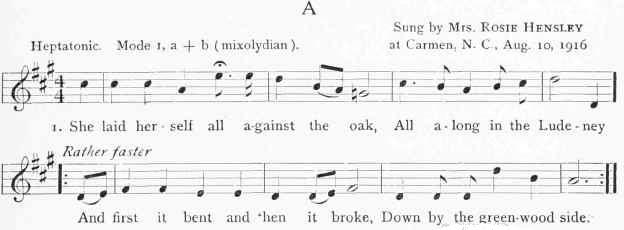The Cruel Mother- Hensley (NC) 1916 Sharp A
[Not a local title. Sharp A, from English Folk Songs from the Southern Appalachians, with music. His notes follow.
In 1950 Karpeles revisited some of the informants they collected from during the 1916-1918 trip. Cowell and Karpeles recorded this family version 34 years later from Emma Hensley for the LOC. Hensley, now Mrs. Donald Shelton, was 13 years old in 1916 when Sharp and Karpeles made their first trip to the Appalachians. The Shelton family is another family from whom Sharp collected ballads and songs.
R. Matteson 2014]
No. 10. The Cruel Mother.
Texts without tunes :—Child's English and Scottish Popular Ballads, No. 20. C. Burne's Shropshire Folk-Lore, p. 540. A. Williams's Folk Songs of the Upper Thames, p. 295. Journal of American Folk-Lore, xxv. 183 ; xxxii. 503. Texts with tunes:—Kinloch's Ancient Scottish Ballads, p. 44 and Appendix. Child, v. 413. Christie's Traditional Ballad Airs, i. 105 and 107. Journal of the Folk-Song Society, ii. 109; iii. 70. Folk Songs from Somerset, No. 98 (also published in English Folk Songs, Selected Edition, Series 1, p. 35, and One Hundred English Folk Songs, p. 35). Gavin Greig's Last Leaves, No. 11. Dick's Songs of
Robert Burns, p. 347. Cox's Folk Songs of the South, pp. 29 and 522. W. R. Mackenzie's Ballads and Sea Songs from Nova Scotia, No. 3. British Ballads from Maine, p. 80. Davis's Traditional Ballads of Virginia, pp. 133 and 560. McGill's Folk Songs of the Kentucky Mountains, p. 83.
The tune of version B is that of The Wife of Usher Well, No. 22. In version I there appears to be a change of mode from Dorian to Mixolydian. The singer is a brother of Mr. W. B. Chisholm of Woodridge, who sang version D. Version A is published in Ballads (School Songs, Book 261), Novello & Co., London, and version E in Folk Songs of English Origin, 2nd Series—both with pianoforte accompaniment.
The Cruel Mother- Rosie Hensley (NC) 1916 Sharp A

1. *She laid herself against the oak,
All along in the Lude-ney;
At first it bent and then it broke,
Down by the greenwood side.
2 She leaned herself all against the thorn,
And there she had two fine babes born.
3 She pulled out her snow-white breast,
And she bid them a-suck for that would be the last.
4 She pulled down her yellow hair,
And she bound it around their little feet and hands.
5 She pulled out her little penknife,
And she pierced all in their tender little hearts.
6 She was setting in her father's hall,
And she saw her babes a-playing with their ball.
7 O babes, O babes, if you were mine,
I would dress you in the silk so fine.
8 O mother, O mother, when we were thine,
You neither dressed us in the coarse silk nor fine.
* The first verse is a reference to giving birth, with the water breaking in the second line. It's more clear in Dan Henneberry's version:
She leaned back against her yoke,
All alone and aloney,
When first it bowed and then it broke,
Down by the greenwood siding.